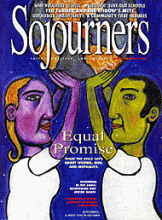Labor activism as an expression of faith? This is an unfamiliar or expressly ludicrous notion to many Christians, even in denominations with a history of such activism on behalf of worker justice. Highly publicized union financial scandals that led to the disqualification of Teamsters President Ron Carey from running for re-election dont encourage such involvement. Even at the best of times, bringing workplace issues to church can make for an uneasy mix.
A plant manager and an assembly-line worker might share the same pew, sing from the same hymnal. Should "worldly" businesscontract negotiations, talk of a buy-out or a strikebe acknowledged in the midst of spiritual communion? How could bridges be built between blunt-talking, secular union organizers and participants in a weekly prayer meetingand for what possible reason? And what might happen to the tithe fund if better-off church members feel the sermons or Sunday school lessons go too far in drawing present-day parallels with Jesus teachings on wealth or the prophets words on exploitation?
Despite the questions and risks, a growing number of people of faith find that solidarity with working people is a vital part of living out the gospel in their community:
In Morganton, North Carolina, a church was the strike headquarters for local poultry workers.
In Los Angeles and several other cities, a key to successful passage of living-wage ordinances has been large-scale involvement by religious individuals and institutions.
This past Labor Day weekend, more than 500 congregations throughout the country had worship services focused on the dignity of work and Gods call for justice in the workplace through the organizing efforts of the National Interfaith Committee for Worker Justice.
Read the Full Article
